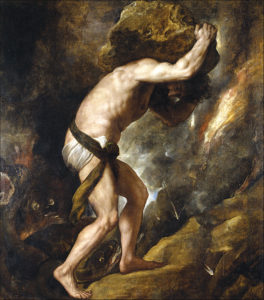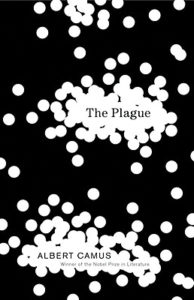Humanism’s Vulnerable Human
 Sisyphus (1548–49) by Titian, Prado Museum, Madrid, Spainprops
Sisyphus (1548–49) by Titian, Prado Museum, Madrid, Spainprops WHILE A NOBEL PRIZE-winning intellectual favored by many academics, the North African Albert Camus also wrote of existential circumstances of war and want that tapped into life conditions experienced by and of concern to a general public. He speaks to particular moments of angst and trauma, and for this reason COVID-19 has sparked a return to one of his books in particular—The Plague (1947). In fact, the publisher reports that the end of February showed an increase in sales of about 150 percent over sales the previous year.
Why We Read The Plague
The fragile and troubled nature of life has been exposed and, naturally, we look for ways to absorb and process this reality—to make sense of our circumstances. The standard social effort to isolate death (and those likely to bring it into our personal circumstances) and thereby safeguard against it has failed. Examples or models of how to think about the angst of demise help, and this is where Camus comes in.
The French Algerian context is the place of his youth. It is where he lived in poverty with his grandmother, mother, and brother. Where he played football and attended school. It is also the location for the novel, the place that slowly succumbs to a plague. Over the course of its pages, the novel chronicles the existential, affective, and psychological response to a deadly virus spread from animals to humans—made visible only as it destroys the physical and emotional integrity of its host. Science seeks to tame, if not end, the virus, and religion seeks to understand (perhaps even justify) it in relationship to the nature and meaning of humanity in relationship to a grand unity of life.
 Theists might pray, but humanists understand such activity has little impact on an unseen force that preys on physical bodies. Human mechanisms of explanation ultimately fail to satisfy, even if they serve to explain the “how” of death. We are left with the existential challenge of “why” this death and the means by which to address that question without at the same time degrading the integrity of life. As the novel points out, human connections might provide a bit of comfort within the context of absurdity that is our relationship to the world—but nothing stems the tide of death. Only how one embraces this particular possibility of death is altered through our thinking and doing within a context of uncertainty and invisible threat. As the novel makes clear, we are powerless—our tools dulled by the persistence of demise.
Theists might pray, but humanists understand such activity has little impact on an unseen force that preys on physical bodies. Human mechanisms of explanation ultimately fail to satisfy, even if they serve to explain the “how” of death. We are left with the existential challenge of “why” this death and the means by which to address that question without at the same time degrading the integrity of life. As the novel points out, human connections might provide a bit of comfort within the context of absurdity that is our relationship to the world—but nothing stems the tide of death. Only how one embraces this particular possibility of death is altered through our thinking and doing within a context of uncertainty and invisible threat. As the novel makes clear, we are powerless—our tools dulled by the persistence of demise.
I imagine many readers look to The Plague for what it might offer in terms of familiarity—that is to say, circumstances like our own that suggest we aren’t the first to encounter death from a source we can’t properly name or control. Others might find helpful the story’s rehearsal of science as they work to critique the ridiculous response of some conservative evangelicals who assume divine purpose in this moment of death, which in turn props up their theologized attack on difference—e.g., gays and lesbians. Still others might find of interest the effort of church representatives to find a theological narrative that tames death. Still others, perhaps some humanist readers, might find most appealing the novel’s turn to human effort to address material circumstances in the face of failed religious claims. This is a muffled but sustained perseverance of humanity despite circumstances—the integrity and value of life found in the living.
French Algeria or the USA
Camus reminds readers of the interconnected nature of all life—the manner in which human existence is tied to other modes of life, seen and unseen. Moving forward, if taken to heart, this understanding encourages humanists to reconceive their humanism in ways that acknowledge and act out a deep appreciation for the human in relationship to a larger network of life, and because of this connection, well-being has to be measured beyond human wants and needs. Work to mitigate, say, climate change or other large-scale modes of destruction gains a more robust justification that extends beyond a human-centered grid of sustainability and instead values the importance of health that blurs distinctions between the human and other forms of life.
But, then there are the final lines of the book:
…the plague bacillus never dies or disappears for good; that it can lie dormant for years and years in furniture and linen-chests; that it bides its time in bedrooms, cellars, trunks and book-shelves; and perhaps the day would come when, for the bane and the enlightening of men, it roused up its rats again and sent them forth to die in a happy city.
There is nothing particularly optimistic about this ending, but I would argue it offers something of deep and abiding value to humanists. Within these concluding words there are lessons of value. Attention to these concluding words urges a sense that agency isn’t restricted to humans—and this is a taming of the worst of humanism’s anthropocentric tendencies. Instead, Camus cautions readers to recognize life is subject to the movement and activity of material forces humans can’t control: this virus doesn’t care about human wants and desires. The human animal doesn’t simply impose its will on the world—such thinking is a terrible distortion of circumstances. Things impact us, inform us, shape us—in a sense determine the nature and meaning of human life.
Simply put, we’re not only part of the world, we’re dependent upon a world that doesn’t bend to our will and doesn’t prioritize the criteria for our well-being. What this should produce is humility, a bit of perspective, that conditions how we move through the world—that measures our “touch” and tames our intentions through recognition that human life isn’t guaranteed. The moral framework for life is modified in this way—highlighting a concern for codes of doing and thinking that commit to a balancing of needs.
We struggle with our own task, work against the threat of this virus, but as Sisyphus we should do this simply because we can.
We are vulnerable, forced to recognize the connected nature of life and death. And what’s more, we lack the ability to clearly identify and gear up against an enemy that can’t be seen—that uses humans as hosts, some of whom even wittingly infect. What we also see is the manner in which difference breeds a type of disregard. In other words, the virus also serves to amplify the vulnerability of particular populations who are already at risk in the United States. Vulnerability is layered on vulnerability.
Yet, this vulnerability isn’t experienced the same. Camus’s story takes place within French Algeria—a location of colonial context that marks difference as problematic. While not identical, the geography of the United States and the threat of COVID-19 also entail trauma amplified by racialization that can weaponize the virus: think of white nationalists wanting to use the virus to attack despised populations. Also worth noting is the way in which social marginalization—African Americans for instance—amplifies rates of infection and death. The deadly combination of racism and classism intensifies already troubling practices of injustice. To be black in the United States is to face the ever-present potential of death—think of Sandra Bland or Michael Brown—through visible forces of social control, and now the invisible virus latches onto these bodies and marks them for death, intensified by racialized access to testing and medical assistance. The virus exposes and makes more graphic the toxic dimensions of our social world. Viral circumstances will change, but will the deadly connotations of marginalization in its various forms?
Ethics?
Perhaps most difficult, however, is the way in which the novel’s end challenges a basic assumption: proper strategies for collective life are outcome driven, with a clear goal achieved. But, according to Camus, we don’t win. The plague ends, but it can come again—emerging out of hiding to hamper life. Citizens of Oran in the novel celebrate a victory of sorts, but the end of the plague isn’t a win over death but rather a break in the action. In our world changed by COVID-19, we do well to heed Camus’s warning: there are threats that we can’t conquer. That is to say, this virus and its impact should remind us that outcome-driven strategies are useful. The idea that we act in the world with the intent of safeguarding life because our goals will be fulfilled is a poor approach, particularly for humanists who make no claims to cosmic aid.
More appropriate in a context where the plague may once again reach out to kill is a sense of perpetual rebellion: an understanding that we struggle to improve circumstances for all of life because we can, not because we will be successful. There is a tragic-comic quality of life that should remind us of the interrelated nature of life and death, as well as the manner in which our best efforts often betray us.
So, why not just surrender and assume this is the end of things as we’ve known them? Why struggle to make improvements? Why work against the spread of this virus? Why attempt to safeguard life in such uncertain times? Simply because we can and not because we are sure (or even likely) to find victory or the fulfillment of our efforts.
Think about this in relationship to Camus’s depiction of Sisyphus and his stone. Punished by the gods, Sisyphus is tasked with moving his stone up a hill, only to have it come back down, and the process starts again…forever. According to Camus, one might think this would defeat him—this is surely what the gods anticipated—because there is no final outcome, no victory. But he continues his task, with full awareness of his circumstances. The short story that names the larger collection—The Myth of Sisyphus and Other Essays—ends with these words:
I leave Sisyphus at the foot of the mountain! One always finds one’s burden again. But Sisyphus teaches the higher fidelity that negates the gods and raises rocks. He too concludes that all is well. This universe henceforth without a master seems to him neither sterile nor futile. Each atom of that stone, each mineral flake of that night filled mountain, in itself forms a world. The struggle itself toward the heights is enough to fill a man’s heart. One must imagine Sisyphus happy.
We struggle with our own task, work against the threat of this virus, but as Sisyphus we should do this (continue our efforts) simply because we can. COVID-19, some day, will withdraw—and we will leave our homes again, gather with family and friends. But the virus won’t be gone, the threat is ever present. Things are “well” not because the threat has been tamed, but because we persist. We should work to make life better, and in so doing we imagine ourselves, like Sisyphus, happy.
Read more articles in our Philosophy in the Time of Pandemic series.
Published in the May / June 2020 Humanist
